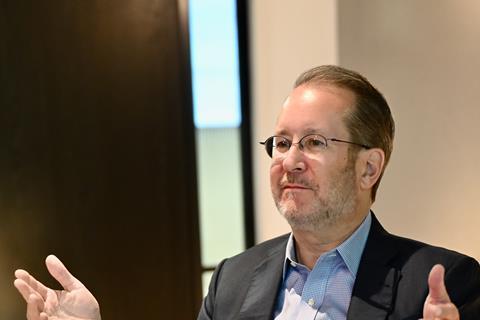Fewer dollars are flowing into the UK economy due to uncertainty in the funding market, the chief of the world’s biggest litigation funder warned today.
Chris Bogart, chief executive of Burford Capital, said the economy was taking a hit as companies like Burford are no longer naming London as an arbitral seat or selecting English law as a dispute resolution mechanism in their international contracts.
Bogart told journalists the government’s failure to address problems posed by the PACCAR Supreme Court ruling was ‘regrettable’, and ‘causing a problem for the London market’.
He said: ‘Look at all the mayhem that you’re seeing from the tariffs from the US. Why are you seeing that? Because markets and businesses don’t like such uncertainty. To invest, you have to have a higher level of certainty. What PACCAR, and the government non-response to it, has done is to create uncertainty. That means you’re likely to see a lower allocation of capital to [that] market.’
He added: ‘The market-wide statistics that we’ve seen here bear that out. It’s hard to get statistics on litigation funding, but [those] that are out there suggest there is less of it since PACCAR. And you’ve seen other demonstrable evidence of effects; for example Therium, a big London funder, the funder that did the sub-postmasters’ case, has [made job losses]. So that’s a sign that the market is not as healthy as you would like it to be.’
Bogart added that before PACCAR, Burford named London as an arbitral seat and specified English law for all its international contracts. ‘It didn’t matter if it had anything to do with London; if we were going to do a financing agreement in, say, India or Dubai, we would try and have English law and London-seated arbitration. And now - we don’t. We’ve stopped doing that. We’ve moved it to another jurisdiction, be it Singapore, Paris, New York. Because we have developed a less predictable dynamic here in this market, and that will mean fewer dollars flowing into the English economy, which is unfortunate because this is one of the major global centres for litigation and arbitration. And when you have losses like that, they take a long time to recover.’
The Burford chief added: ‘Clarity and predictability are an important part of law: it’s not supposed to be something that’s made up and new every time. If you have that kind of dynamic then it’s harder to attract capital, it’s harder to get cases to run. It was already hard enough in this market, because this is an expensive market. What is already happening in the UK is that you price the mid-sized case out of the market. And as you keep on making it more expensive, more difficult and more risky, you just keep on raising the bar for what kind of case is capable of getting funded.’
Bogart also reflected on what he would like to see from the Civil Justice Council’s current review of litigation funding. The CJC review will examine the need for tougher regulation of the sector, among other issues.

He said: ‘I’m hoping the CJC tells the government it’s important to restore a degree of predictability and stability into the market. There’s no need for a big regulatory apparatus here. The thing that people forget is that in most kinds of finance, regulation happens on a spot check-style level; and when you transact with your broker, the odds of that transaction being examined by the FCA [Financial Conduct Authority] are very, very small. [But] in litigation, there is a regulator in every single case. That’s called the judge. Judges have broad powers to manage what goes on in the cases before them.
‘So this is a solution in search of a problem. You haven’t had any sort of history of problematic activity in the sector which warrants an intrusive regulatory response, so I hope that’s the conclusion of the CJC, and that people will get back to business.’
This article is now closed for comment.































4 Readers' comments